Work decisions can be a challenge—whether it’s determining a comp plan for a candidate, setting the price for a new product, or taking steps to improve first contact resolution. No matter what your role, data makes decisions easier.
However, not all companies are set up to give workers the data they need. In a recent study of U.S. workers, we found that two-thirds (64%) have made a poor decision at work due to some issue with data.
We also asked workers about the role data plays at their organization and found that workers believe data has a big impact on all aspects of work—from good decision making, to proposing an idea with confidence, and having trust in their teammates and leaders.
Read on to learn more about data at work and how employees are impacted by its use.
1. Does data reveal the truth or support the status quo?
Making “data-driven decisions” might feel like an obvious need, especially in today’s competitive and risk-adverse business environment.
That’s why we were surprised to learn that less than a quarter (21%) of employees say that data fully determines business decisions at their company. While the majority (62%) of workers say data helps with decisions, another 12% say data inspires ideas but not decisions.
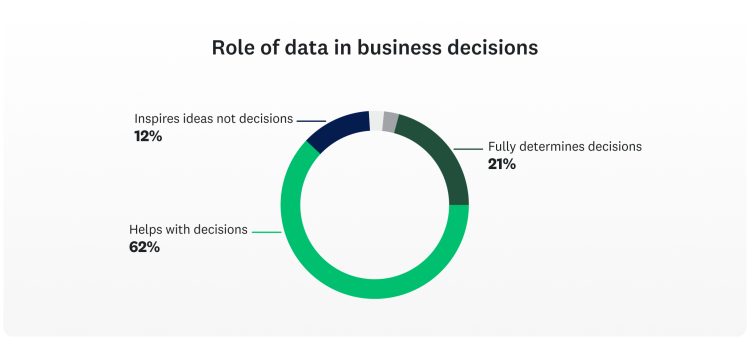
Data appears to be readily shared amongst employees. Eight out of ten workers say their company shares data to help employees understand business decisions. Over two-thirds (67%) say their company shares raw business data with employees.
However, whether data is used in the right way varies. Almost four out of ten (39%) of individual contributors say data is used to back up pre-existing ideas. However, the majority (59%) of workers say the primary goal of data at their company is to uncover the truth, with 69% of the C-suite saying they use data to get to the truth.
Actions might speak louder than words. Almost six out of ten (58%) employees say their leaders are more influenced by impressive visuals or soundbites than in-depth data.
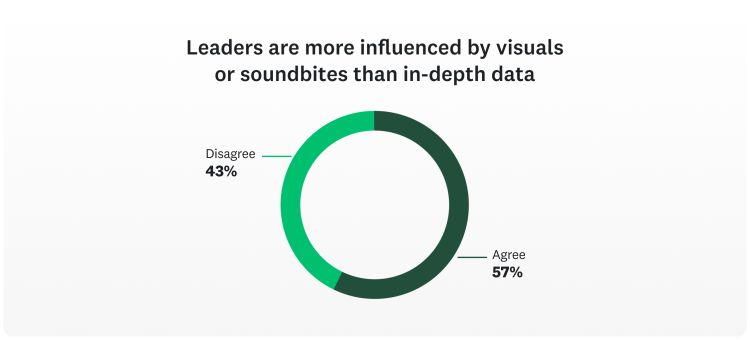
A good-sized portion of the C-suite agrees—43% executives admit leadership is more impressed by visuals and soundbites than data.
2. Intuition vs data: C-suite and workers disagree
Listening to your gut can be an important part of decision making, but employees have mixed feelings about it. In almost all cases, employees were more inclined to use data for decision making vs. trusting their intuition.
Half of employees say you need data all the time to make decisions, and 99% say you need data at least some of the time or always. Over half (53%) of workers say their company trains them on how to use data for decision making.
Workers have gotten more adept at working with data, and have positive feelings about it in general. Most think of data as something that makes them feel informed, curious, and empowered; less 10% say it makes them feel overwhelmed, confused, or scared.
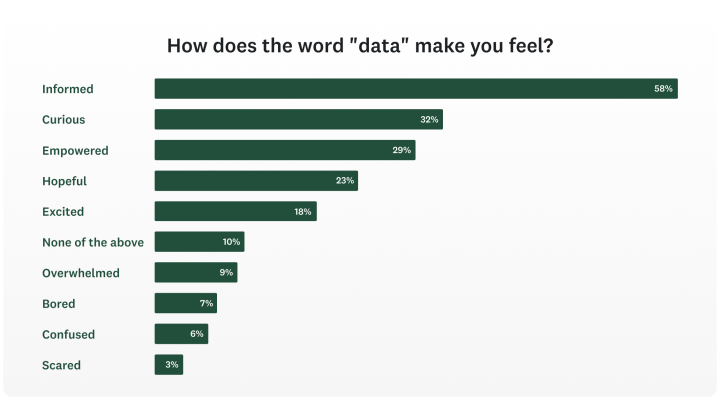
Data gives employees confidence, and makes them more comfortable with their own decision making. In fact employees are almost 2X as comfortable making decisions based on data vs. using their intuition.
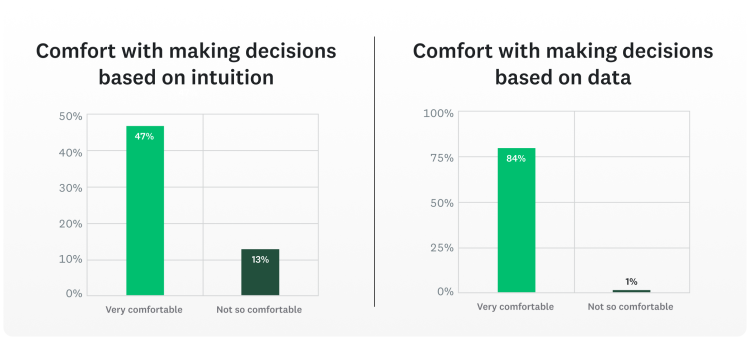
It’s understandable—there’s a lot of data floating around most organizations, and it can be difficult to interpret. The top three data sources workers say they rely on are transactional data (40%), CRM data (36%), and website analytics (30%). A significant portion of workers also use outside research and reviews.
Data analysts are the most likely workers to interpret data, followed by the employees that are closest to the problem. But employees say that when confronted with conflicting stats, upper management (41%) and executives (28%) are the most likely to make the call vs. an analyst or individual contributor (15%).
This might explain another surprising stat—in our study, workers say almost a third of leaders make decisions based on intuition. Further, 70% of employees would lose trust in a leader who makes decisions based on intuition.
31% of employees say their leaders make decisions based on intuition rather than data
Perhaps when the data gets complicated, or there’s not clear “right” answer, leadership weighs in to keep things moving.
3. Data breeds empowerment and trust
That leads to possibly the most fundamental question about data at work—can you trust your data and the people who access it?
In our study, 53% of workers say they worry about misinterpreting data used in their job. And 54% said they were always or sometimes unsure about how to get the data they needed. Is it workers’ skills, their peers, or the data itself that’s the problem?
When we asked workers these questions, 61% said they trust the accuracy of the data they have access to a lot. Seven out of ten (69%) said they trust the decisions they make from this data a lot.
And there are times when workers trust data more than their co-workers. In our study, 75% of employees would trust someone with extensive data on hand to make an important decision more than someone with a higher job title. That number jumps from 75% for individual contributors to 80% for C-level executives.
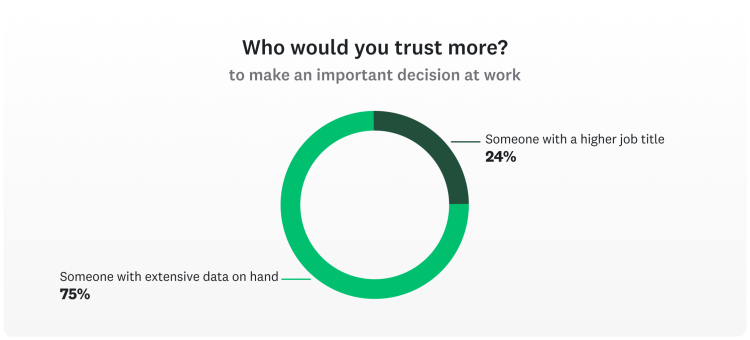
Workers who use data in their jobs are comfortable sharing data even when the results are negative and could reflect poorly on them or their team’s work—81% report to being very or somewhat comfortable.
C-level executives tend to be more comfortable sharing “negative” data; 45% are very comfortable compared with 37% of individual contributors.
Leaders are particularly vulnerable to being judged for how they rely on data. According to our study, almost three-quarters of employees said they were likely to lose trust in leaders who rely only on intuition for making decisions.
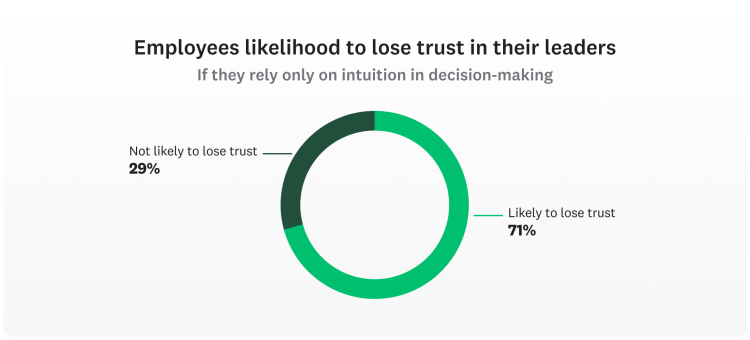
There’s an important takeaway for leadership here—not only are employees more trusting of leaders who use data, they are inclined to lose trust in those that don’t. And, in almost every case, employees report that it’s critical that data has a role at the table.
How does your company use data at work?
Empowering employees to harness data seems to be the easy part—the challenge is to make data accessible to employees who are trying to get to the truth. By making data an expected part of all decisions, companies can create the kind of data-driven environment that delivers more positive outcomes, company wide.
No matter what your role—from HR, to marketer, or CX pro—there are tools that make it easy to get answers about your customers, employees, and the market. Here’s a link to our templates, or a tour of our survey solutions.
Methodology: SurveyMonkey “Data at work” poll was conducted July 19-30, 2024 among a sample of 5,876 full-time workers in the US. Respondents were selected from a non-probability online panel. The modeled error estimate for these surveys is plus or minus 1.0 percentage point. Data has been weighted for age, race, sex, education, and geography using the Census Bureau’s American Community Survey to reflect the overall demographic composition of the United States.



